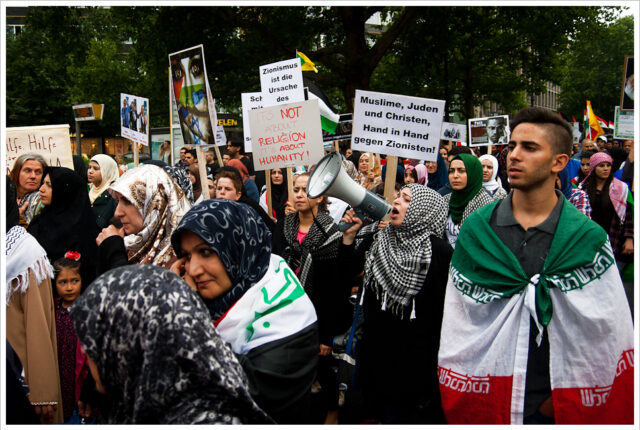The urban riots that engulfed France in the summer of 2023, after a teenager of North African descent was shot dead by police during a traffic stop, showcased the decades-long failure of the French state to adequately integrate millions of immigrants — particularly those with origins in Africa and the Middle East.
Nahel Merzouk, a 17-year-old French citizen of Algerian and Moroccan origin, was killed when he resisted arrest and tried to run over a police officer with his car in Nanterre, a suburb of Paris. The 38-year-old officer, who said he acted in self-defense, was subsequently arrested and charged with voluntary manslaughter. The French judiciary will determine his fate.
Merzouk’s killing, which was recorded on a cellphone video and widely shared across social media, unleashed eight days of extreme violence that left a trail of destruction not seen in France since similar migrant-related riots in late 2005. Police said they were “at war” with “savage hordes” of angry rioters with an “us-versus-them” mentality who destroyed police stations, schools, shops, banks, town halls and courthouses, and torched thousands of cars. The riots, which caused more than one billion euros in damage, were contained only after the French government deployed 45,000 security forces, who arrested more than 4,000 rioters.
Many media outlets and political commentators were quick to attribute Merzouk’s death and the subsequent riots to police brutality and “systemic racism” within French law enforcement. French President Emanuel Macron, apparently seeking to quell the violence, condemned the shooting as “inexplicable” and “inexcusable” and called for justice to be served. French police, he said, are required to do their job “within an ethical framework that must be respected.”
Even if the riots were triggered by police misconduct, the hate-induced arson, looting, and vandalism on such an unprecedented scale point to a much larger failure of governance in France — especially regarding immigration and integration. For at least 50 years, successive governments have been unable or unwilling to limit mass migration or to properly integrate immigrants into French society.
Myth of Return
To better understand the immigration crisis gripping France and other European countries, it helps to distinguish between at least two different categories of non-Western immigrants.
On the one hand, there are the recent newcomers — sometimes loosely referred to as first generation immigrants. During the past two decades, millions of migrants from the Middle East and South Asia, as well as from North Africa and sub-Saharan Africa, have reached European shores. The migration flows accelerated in 2015, when German Chancellor Angela Merkel opened the immigration floodgates and allowed more than one-and-a-half million refugees and asylum seekers from Syria and elsewhere into countries of the European Union.
On the other hand, there are the second- and third-generation immigrants who are European-born children and grandchildren of the so-called “guest workers” who arrived in Europe in the 1950s and 1960s when, in the aftermath of the Second World War, countries such as France and Germany faced labor shortages. The assumption was that the guest workers would eventually return to their countries of origin. Instead, in what is sometimes referred to as the myth of return, they stayed in Europe, became permanent residents, and set into motion endless chain migration.
In France and Germany, non-Western guest workers hailed mainly from Turkey and from former French colonies in North Africa and sub-Saharan Africa. Many guest workers lived on the margins of the host society and never properly integrated. In France, millions settled in so-called banlieues, working-class suburbs on the outskirts of large cities.
Over time, the banlieues turned into blighted and poverty-stricken slums with high rates of unemployment and runaway lawlessness. For the original guest workers, moving to the banlieues was a step up the economic and social ladder in comparison to the conditions they left behind in their homelands. For their children and grandchildren, living there — where youth unemployment commonly is above 50 percent — generally is a ticket to permanent despair.
The second- and third-generation migrants who grow up in the banlieues often are effectively stateless citizens. Although they technically are French citizens by virtue of birth, they frequently are regarded as second-class citizens by the rest of French society. Many have never left France and furthermore do not identify with the culture of their parents or grandparents. They constitute a permanent underclass that numbers in the millions. Many of them abhor France and all symbols of the French state and are a powder keg ready to explode at a moment’s notice. They are the ones largely responsible for the recent riots that laid waste to cities across France.
Multiculturalism
In the aftermath of the Second World War, the deadliest military conflict in human history, European policymakers concluded that nationalism was responsible for the carnage. They surmised that if social engineering could dilute what it means to be French or German, the chances of war in the future would be diminished. This dubious assumption led to five decades of policies promoting multiculturalism through mass migration to Europe from mostly Muslim countries. They permanently changed the ethnic composition of the continent.
These irreversible policies have eroded the social fabric of France, Germany, and many other European nation states by introducing parallel societies in which ethnic or religious minorities separate themselves from mainstream society and remain segregated rather than become culturally integrated into their European host nations.
In France and Germany, mass migration from the Muslim world has fast-tracked the rise of Islam, as evidenced by the proliferation of Sharia courts, polygamy, child marriages, and honor violence. Mass migration has also fueled social chaos, including jihadist terrorism, and rising levels of crime, including mass sexual violence against European women, and runaway antisemitism. During the past decade, tens of thousands of Jews have emigrated from France to Israel due to record levels of antisemitism often perpetrated by Muslim immigrants.
Consider the so-called no-go zones — lawless areas where the state has effectively lost control, and where native Europeans increasingly fear to tread. In France, the government has identified more than 750 Sensitive Urban Zones (Zones Urbaines Sensibles, ZUS), as they are euphemistically called, home to an estimated 6 million Muslims who are not integrated into French society. These areas have been referred to as “the lost territories of the French Republic.”
In Germany, police have identified at least 40 so-called problem neighborhoods (Problemviertel), areas where large concentrations of migrants, high levels of unemployment and chronic welfare dependency, combined with urban decay, have become incubators for anarchy. “In Berlin or in the north of Duisburg, there are neighborhoods where police hardly dare to stop a car because they know that they’ll be surrounded by 40 or 50 men,” said Rainer Wendt, president of the German Police Union. “These attacks amount to a deliberate challenge to the authority of the state — attacks in which the perpetrators are expressing their contempt for our society.”
Similar situations are commonplace in Austria, Belgium, Italy, Spain, and Sweden, among other European countries, where governments have failed to fulfil their constitutional duty to provide security and protect and defend citizens. The result is a vicious cycle in which many immigrants reject their host countries, and the host societies reject the immigrants, leading to permanent estrangement.
Islamism
The failure of European governments to integrate migrants from the Muslim world has been a boon for Islamist groups, whose objective is to replace Europe’s liberal democratic order with Islamic law. The purveyors of radical Islam — who oppose Western concepts of freedom of speech and equality of the sexes — relentlessly scout deprived neighborhoods in Europe in search of socially marginalized youths who feel disillusioned with their lives and for whom Islam fills a spiritual void.
Germany’s domestic intelligence agency, the Federal Office for the Protection of the Constitution (Bundesamt für Verfassungsschutz, BfV), reports that Germany is home to more than 25,000 Islamists, nearly 2,000 of whom pose an immediate threat of attack. The largest Islamist movement in Germany is Salafism, an ideology that seeks to establish a global Islamic theocracy based on Sharia law and is civilizationally incompatible with Western society.
Encouraging “Dialogue”
Despite the growing threat posed by Islamism, Germany’s coalition government recently dissolved an expert working group on political Islamism — opting instead to fight “Islamophobia.” It commissioned a report about “Muslimophobia” that was produced with help from Islamist groups linked to Iran and Turkey and branded virtually all criticism of Islam or Islamism as “anti-Muslim hostility.”
In France, the French Islam Forum (Forum de l’Islam de France, FORIF), a newly launched Muslim “dialogue forum” established by the French government to fight Islamism and promote an Islam “faithful to the values of the Republic,” has already been infiltrated by Muslim Brotherhood operatives opposed to the domestication of Islam in France.
FORIF is an integral component of an ambitious plan announced by President Emmanuel Macron in February 2020 to preserve the constitutional principle of secularism (Laïcité) and fight Islamist separatism by creating an “Islam of France” — an Islam rooted in French society and one that limits the role that foreign governments have in training imams, financing mosques, and educating children in France.
Meanwhile, European governments continue to allow Muslim countries, including Morocco, Qatar, Saudi Arabia, and Turkey, to increase their control over Muslims in Europe. This is done by building mosques, Quranic schools and makeshift prayer rooms that are heavily influenced by the national origin of the founder or president of a given mosque, to exert foreign control over Muslims in Europe and discourage integration.
“We are against assimilation,” Turkish President Recep Tayyip Erdoğan declared during a speech to the Turkish diaspora in Germany. “No one should be able to rip us away from our culture and civilization. Our children must learn German, but first they must learn Turkish.” He claimed that requiring Turks living in Germany to learn German was a “violation of human rights.”
In France, a group of retired generals recently warned in an open letter that the country is sliding toward a civil war due to the government’s failure to control mass migration and creeping Islamism in the country. The letter, which, according to polls, had broad public support, also warned against cultural Marxism, runaway multiculturalism, and the expansion of no-go zones in France.
Demographics
Europe’s immigration and integration problems are merely symptoms of a far more serious underlying root cause: demographic collapse. In 2022, every single one of the EU’s 27 member states had sub-replacement fertility rates. Replacement level fertility refers to the average number of children born per woman at which a population replaces itself from one generation to the next — without immigration. In developed countries, the replacement fertility rate is around 2.1 births per female. In 2022, the EU’s average fertility rate was 1.5 births per woman, continuing a decades-long trend.
When the fertility rate falls below replacement level, the population simultaneously ages and declines, which results in lower numbers of workers available to sustain overburdened social welfare systems. European policymakers appear to have concluded that rather than creating the economic conditions needed to promote increased fertility, it is easier to make up the labor shortfall through mass migration of largely unskilled single males.
Germany, for instance, will need to take in 300,000 migrants annually for the next 40 years to stop population decline, according to a recently leaked government report. The document revealed that the German government is counting on permanent mass migration — presumably from Africa, Asia, and the Middle East — to keep the current size of the German population (83 million) stable through 2060.
The report implied that Chancellor Merkel’s decision to allow into the country some 1.5 million mostly Muslim migrants between 2015 and 2016 was not primarily a humanitarian gesture, but a calculated effort to stave off Germany’s demographic decline and preserve the future viability of the German welfare state.
If most of the new migrants arriving in Germany for the next four decades are from the Islamic world, the Muslim population of Germany could jump to well over 20 million and account for more than 25% of the overall German population by 2060.
The Rise of Anti-Immigration Parties
The unprecedented pace and scale of such ethnic change is a recipe for social chaos and is already fueling the rise of anti-immigration parties in Europe. In Germany, half of voter support for the populist party Alternative for Germany (Alternative für Deutschland, AfD) comes from people who are not right wing but are concerned about mass migration, according to a recent survey by the Allensbach Institute. In France, Marine Le Pen, parliamentary leader of the anti-immigration National Rally party (Rassemblement National, RN), is now the second-most popular politician in the country, according to a new Viavoice poll commissioned by the daily newspaper Libération.
Meanwhile, the migration flows to Europe show no signs of abating. EU officials expect at least 350,000 irregular migrants to enter Europe in 2023, on top of the 330,000 irregular entries in 2022. The actual numbers are certainly much higher as many migrants enter the EU undetected.
The UN Refugee Agency estimates there currently are 700,000 migrants in Libya and Tunisia (90 percent of whom are economic migrants), and up to one million in Sudan, many of whom want to cross the Mediterranean Sea to Europe.
The unrest in France may have subsided for now, but it can — and almost certainly will — flare up again at a moment’s notice. The problems of mass migration, integration and demographic decline are not limited to France and Germany. They affect all countries in Western Europe, where governments — with the possible exception of Denmark, where the Social Democrats have implemented a raft of sensible measures to curb mass migration and promote integration — are denying reality and appear unable or unwilling to acknowledge that the multicultural model has failed. Europe’s future hangs in the balance.
Soeren Kern is a Middle East Forum Writing Fellow.






